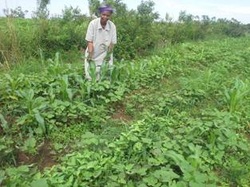 Over the past five years we have had the pleasure of meeting missionaries from several continents and dozens of countries. What a joy it has been to build relationships with them and learn their culture and customs. One of the most intriguing aspects of our new relationships has been learning the different traditions surrounding Christmas. The Germans have told us about St. Nicholas day on December 6th when they would put out their largest shoe or boot. The next morning it would be filled with candy. Even twenty year old students still practiced the tradition last year. The Dutch talked about a Christmas tree but no mention of Santa Claus. The same is true in Africa. In some countries the giving of gifts is significantly reduced and the church plays a stronger role during Christmas. Even missionaries from the same country would have different traditions from region to region. It has been eye opening for us. We would all acknowledge that the central focus of Christmas is the birth of our Lord and Savior Jesus Christ. Commercialization has so infected the holidays that it can easily veil the true meaning of this holiday. Consider starting a new tradition this year that will highlight the birth of Jesus as the focal point in your home and community. Our experiences of past Christmas’ are so rich, warm and meaningful. We have yet to find someone who didn’t smile when the subject of Christmas came up. May your holiday be filled with tender experiences as you spend time with those you love. Thanks for the many investments you have made this year to help others see the reality of Jesus. It has been a great joy to walk with you into the hearts of ministry leaders in so many places. We are deeply grateful for your heart and vision. Pictured is one the corn fields planted for orphans in Swaziland. Numsa Lukele, the leader of the ministry Asondle Sive Bomake (Siswati language for Let’s feed the Nation Mothers), is pictured in one of the corn fields planted to feed over 900 orphans in the Kaphunga area of villages in the mountains. We provided the seed corn together to ensure these children can eat in 2014. It is a blessed Christmas as corn and squash are coming up in this remote area. Have a blessed Christmas. Cathy and Danny Sartin 901-351-2996 www.deeperstillmissions.com
0 Comments
We spent four hours driving through Swaziland until we came to an unmarked dirt road. We turned up the hill and immediately began dancing over the bumps and rocks. The dirt road was filled with gullies from hard rain and hundreds of little bumps from former vehicles. The car would swing back and forth and create a dust storm behind us. The road would switch back and forth as it climbed the side of the mountain and went from one peak to another. Then came the surprise of another vehicle shooting down the hill in an almost uncontrollable manner. The fog of dust behind them would temporarily blind you and you would take a deep breath and hope you don’t go over the cliff.
We drove thirty minutes on the dirt roads until we saw a sign announcing the village of Ka-Phunga. (Swazi for smell, presumably the blood smell from the war with the Zulus) You could see some simple buildings. Then it struck me. Here in a remote area of Swaziland was a Korean vehicle and center built to introduce Buddhism to the tribes in the mountains. They had poured vast amounts of money into this community center and had staffed it with many people. It was as if the thought had never occurred to me that Buddhists would be attempting to spread their faith in such a place. We continued the climb until we reached some areas that were familiar to me. I saw a home of an elderly man who I had prayed with over a year ago. The missionary noted that he is doing better. Memories flashed in my mind of the house, the people, the room and that special moment from the past. We came closer to the home of Numsa Lukele and the hundreds of orphans who are victims of the HIV/Aids epidemic. Over 900 children in these six small villages are continuing without their parents. Unfortunately those child led homes are scattered over a vast and remote area of these mountains. It can be an additional 45 minute drive just to reach another village. The school in Ka-Phunga has a water well available only for the children attending that school, not for the community. Water is a precious commodity in this remote place. Everyone must walk to the streams lower in the valleys to draw water for use at home. Several hours each day is taken by the task of gathering water. It is their way of life. We turned off the dirt road onto a path with tire ruts from recent rains. We passed mud homes, roaming cattle, walking children and huge boulders. The path got smaller as we drove back into the remote mountain top near our destination. It switched back and forth over large rocks and muddy puddles. Then we reached the gate and turned into the corn field headed to Numsa’s home. The arduous journey was now over as we pulled into the yard of the Lukele home. We were greeted by family members and the stately matriarch of the family. Numsa lovingly put her arms around Cathy and myself when we walked into her home. Her welcome was very warm. Unknown to us she had prepared a lunch for our arrival. We sat, ate and discussed the ministry she is orchestrating among the orphans. 29 Gogos (grandmothers) are partnering with her to reach out and teach these orphans how to grow corn, prepare a meal, and run a home for their brothers and sisters. She has gotten permission from local tribal chiefs to plant a field of corn for the orphans in each village area. Each grandmother plants a vegetable garden to assist the children with food. They teach life skills and the truth of Jesus Christ to these lonely children. My heart soared as the reality of this vision in the heart of Numsa became more clear. Harvest time was recent in the corn fields. Numsa took Cathy and me to see the harvested corn. The corn crib was full. I noticed a second crib for corn but it had only a third of the amount in Numsa’s crib. My heart sank when she told me this crib is from the children’s field. I asked why one was so full and the other is very short. The money was three weeks late to purchase the seed corn and the crop did not produce as much. Late, why? The ministry funneling the money to her group had been slow to process and send the money. Politics had clearly played a role. The crop would have to be subsidized by corn purchased to fill in the gaps. We visited a small feeding center for orphans in the immediate area. Over 50 children come to get a meal once a day. Outside the gate two bulls charged and wrestled with one another. Their horns were locked and dust was flying. The local people hardly took note. It was amazing for us. Cathy and I delivered a small gift and some money from a generous lady in Memphis to purchase 15 bags of corn to be used in November. It will take 25 bags each month for four months to fill in the gap of corn. She was very excited to see the funds come to start the process of securing additional corn. Her excitement was written all over her face. Her little grandson was in the room with us and became a point of interest for Cathy. We both worked on getting him to smile. It took a while, but he finally came around. I wondered how long it takes to get the orphans to smile. Thank you for sending us to Africa. Cathy flies to Cape Town while I return to the States to teach at a youth conference in Missouri. Pray for us as we are apart for two weeks on two continents. We know your prayers are vital to us and it shows in what God is doing. It’s a privilege to have you join with us to serve our Lord Cathy and Danny Sartin www.deeperstillmissions.com Copyright © Danny Sartin and Deeper Still Missions. All Rights Reserved. This on the field report is written for those who support Deeper Still Missions and our goal of missionary retention. Re-Prints Deeper Still Missions devotionals are protected by international copyright laws. To request reprint permission contact the offices of DSM. Permission is granted and encouraged to forward this email in its entirety to others without making any changes or deletions. To unsubscribe from reports just reply to this email with the subject unsubscribe. You can contact Deeper Still Missions at P.O. Box 343370 Bartlett, TN 38134. 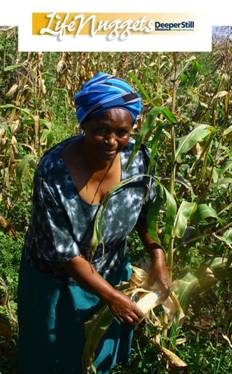 The lady pictured on the left is Numsa Lukele of Khaphunga, Swaziland. See is the mother of a missionary spouse who lives in South Africa. We had the pleasure of visiting her home and communities twice over the last two years. Numsa saw a need in this mountainous area of her country that could not be ignored. Orphans were multiplying at an astronomical rate due to the HIV/Aids epidemic. It is actually the highest rate by far in all of the world. These areas of KwaZulu-Natal and Mpumalanga in South Africa along with the small country of Swaziland have the highest rate of infection of anywhere on earth. Children led homes became the norm as over 1,500 orphans had been identified in eight villages around Kaphunga during the peak of the disease. Today they are working with over 900 children. I had the pleasure to visit those villages with Numsa and her family. She is proudly pulling back the shucks on an ear of corn planted and ready to be harvested by the orphans. After she showed the corn to me she carefully replaced the shucks back on the cob so it would finish the maturing process. 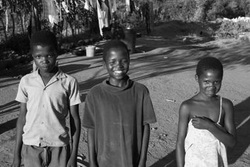 Numsa had to get permission for the chief of each tribe to plant in specific fields for the orphans. Then she had to find resources to buy seeds for the planting. The children do all the work to prepare, tend and harvest the crop. Numsa has recruited almost thirty grandmothers from those villages to work with children in each village. They teach them how to survive and provide for themselves. They also teach the truth about Jesus Christ. I was deeply humbled and touched by her mission! Late in the day she took me to a small hut declaring that she wanted me to meet some children. They had been discovered some time back eating dirt. Both of their parents had died and the oldest was trying to care for his little brother and sister. One of the grandmothers had agreed to bring the trio to live along with her own children. I had no idea how this impoverished couple could give anything to three orphan children. The children were excited that the tall American was showing them some focused attention. The younger children laughed and smiled. The oldest would not. He had shouldered the brunt of his parent’s death. You could see it in his eyes. But they followed me around and all the way to the gate when I left. It meant so much to them that someone cared. What is your mission for Christ? Who has needs right around you? Open your eyes and your heart and reach out to others who need our Lord and Savior. You don’t need formal training just a tender and loving heart. Cathy and Danny Sartin www.deeperstillmissions.com Copyright © Danny Sartin and Deeper Still Missions. All Rights Reserved. Life Nuggets are written for those who support Deeper Still Missions and our goal of missionary retention. Re-Prints Deeper Still Missions devotionals are protected by international copyright laws. To request reprint permission contact the offices of DSM. Permission is granted and encouraged to forward this email in its entirety to others without making any changes or deletions. To unsubscribe just reply to this email with the subject unsubscribe. You can contact Deeper Still Missions at P.O. Box 343370 Bartlett, TN 38134. 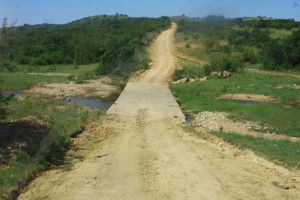 The remote roads of KaPhunga. This past week I drove into the highest concentration of HIV/Aids in the entire world. Swaziland is infested with the disease and it has devastated the adult population in the last ten years. There are over 56,000 orphans in this tiny little African country. The country is very beautiful. Majestic mountains, rolling hills and deep v shaped valleys mask the silent killer among the people. Life is basic and the most difficult tasks are the essential needs to sustain life. Finding usable water and food. Almost three years ago God connected us with Ronas Marule a missionary in the neighboring South African province of Mpumalanga. His mother-in-law is Numsa Lukhele a significant leader in the rural villages of Southern Swaziland. She and Ronas established a ministry to train and feed orphans in an eight village area. Numsa has recruited 29 mothers and grandmothers in those eight villages to be a care giver to children in each area. She secured fields from the local chiefs to allow children to plant corn for food. Each of the care givers plant a vegetable garden to supplement the corn. Numsa raises chickens for eggs and sells them to help sustain the needs of the children. It is a massive operation because these villages hold over 900 orphans in this remote area. We climbed into a van with Numsa, Ronas and the son of Numsa to visit some of the villages. We drove for over an hour down bumpy and dusty gravel roads to the village of Ngobelweni. This area is one of the most remote areas they serve. The care giver, Maria, met us at her home and showed us around. Numsa was suggesting a water well be placed here to serve the 120 children and families who live in the secluded area. We spent the entire day looking at villages and meeting families who serve these children. The final visit was to the village of Eyishineni late in the day. We actually had to abandon our vehicle and walk the final stretch up to the homes. I was introduced to three children who had been discovered eating mud after their parents had died. Sandile, Mcolisi and lindelwa were wonderful kids. Sandile was shy and would not smile despite my attempts to get him to do so. His pants were torn at the crotch. They were torn on the seam of the leg and torn in the seat. You could see his embarrassment as he tried to hide the openings. It was his only pair of pants. The family who took the children in was Albert and Thuli and their children. They were obviously dirt poor. They sat on grass mats on the soil. Albert had broken his leg and is now out of work. Numsa had brought a large bag of mealies for their food. I have much to process about my visit to Swaziland. It takes my breath away to grasp the enormity of the problems. I guess I can more clearly understand the feelings of the disciples when Jesus asked them to feed the 5,000. I had to pause and reflect when we went through customs and returned to South Africa. The agent, well aware of Ka-Phunga and its isolated issues, was surprised that an American was visiting the remote area. She looked around Ronas to see this white man who would stopover at such a hopeless place. It made no sense to the agent that someone would list Ka-Phunga as a tourist destination. Thank you so much for your prayer. I preach in Graskop today and do the same for Easter weekend in a community called Kinross. This will be my final week in Africa before returning home a week from Tuesday. |
Danny SartinFour decade veteran of youth ministry in churches, Youth For Christ and now is the Founder and Executive Director of Deeper Still Missions. Danny and his wife Cathy spend most of their time mentoring missionaries in Africa, Europe, Central America and North America. Future opportunities include South America and the Asia Pacific area. Archives
November 2023
Categories
All
|

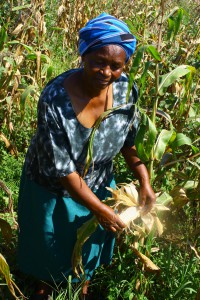
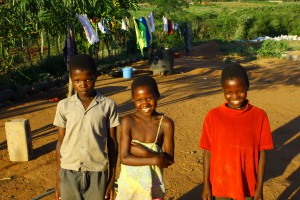

 RSS Feed
RSS Feed